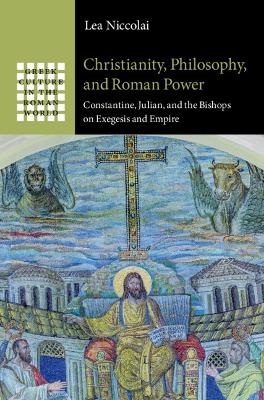
Christianity, Philosophy, and Roman Power
Constantine, Julian, and the Bishops on Exegesis and Empire
Seiten
2023
Cambridge University Press (Verlag)
978-1-009-29929-9 (ISBN)
Cambridge University Press (Verlag)
978-1-009-29929-9 (ISBN)
Shows that the paradox of the late antique clash between Christianity and Greco-Roman culture is that classical culture wrote the script for the Christianisation of Roman power. Emperor Julian's writings reveal the continuous influence of traditional philosophical ideals in shaping the competition between fourth-century pagan and Christian leaders.
This book rethinks the Christianisation of the late Roman empire as a crisis of knowledge, pointing to competitive cultural re-assessment as a major driving force in the making of the Constantinian and post-Constantinian state. Emperor Julian's writings are re-assessed as key to accessing the rise and consolidation of a Christian politics of interpretation that relied on exegesis as a self-legitimising device to secure control over Roman history via claims to Christianity's control of paideia. This reconstruction infuses Julian's reaction with contextual significance. His literary and political project emerges as a response to contemporary reconfigurations of Christian hermeneutics as controlling the meaning of Rome's culture and history. At the same time, understanding Julian as a participant in a larger debate re-qualifies all fourth-century political and episcopal discourse as a long knock-on effect reacting to the imperial mobilisation of Christian debates over the link between power and culture.
This book rethinks the Christianisation of the late Roman empire as a crisis of knowledge, pointing to competitive cultural re-assessment as a major driving force in the making of the Constantinian and post-Constantinian state. Emperor Julian's writings are re-assessed as key to accessing the rise and consolidation of a Christian politics of interpretation that relied on exegesis as a self-legitimising device to secure control over Roman history via claims to Christianity's control of paideia. This reconstruction infuses Julian's reaction with contextual significance. His literary and political project emerges as a response to contemporary reconfigurations of Christian hermeneutics as controlling the meaning of Rome's culture and history. At the same time, understanding Julian as a participant in a larger debate re-qualifies all fourth-century political and episcopal discourse as a long knock-on effect reacting to the imperial mobilisation of Christian debates over the link between power and culture.
LEA NICCOLAI is Assistant Professor in Late Antique History at the University of Cambridge and a Fellow of Trinity College.
Introduction; Part I. At Constantius' Court: Julian Caeser: 1. How philosophers should take compliments when they happen to become kings; 2. Climbing the ladder; Part II. Making and Breaking Constantine: Julian Augustus; 3. Holy hermeneutics; 4. A life for a life; Part III. After Julian: Philosophy in the World: 5. Those who know if the emperor knows; 6. Wisdom for the many, and wisdom for the few; Conclusions.
| Erscheinungsdatum | 25.05.2023 |
|---|---|
| Reihe/Serie | Greek Culture in the Roman World |
| Zusatzinfo | Worked examples or Exercises |
| Verlagsort | Cambridge |
| Sprache | englisch |
| Maße | 152 x 229 mm |
| Gewicht | 524 g |
| Themenwelt | Geschichte ► Allgemeine Geschichte ► Vor- und Frühgeschichte |
| Geisteswissenschaften ► Philosophie | |
| Religion / Theologie ► Christentum ► Kirchengeschichte | |
| ISBN-10 | 1-009-29929-8 / 1009299298 |
| ISBN-13 | 978-1-009-29929-9 / 9781009299299 |
| Zustand | Neuware |
| Informationen gemäß Produktsicherheitsverordnung (GPSR) | |
| Haben Sie eine Frage zum Produkt? |
Mehr entdecken
aus dem Bereich
aus dem Bereich
Konzepte – Methoden – Theorien
Buch | Softcover (2024)
UTB (Verlag)
39,90 €
meine Suche nach den Urzeit-Genen
Buch | Hardcover (2024)
DVA (Verlag)
26,00 €


